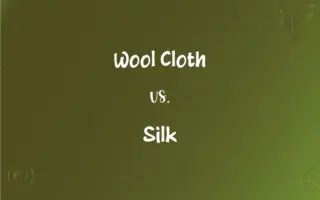Polypropylene vs. Polycarbonate: What's the Difference?
Edited by Aimie Carlson || By Janet White || Published on December 19, 2023
Polypropylene is a thermoplastic polymer used in a wide range of applications, known for its toughness and resistance to chemicals. Polycarbonate is a durable, transparent thermoplastic with high impact resistance, used in eyewear and bullet-proof glass.

Key Differences
Polypropylene is a versatile thermoplastic polymer, commonly used in packaging, textiles, and automotive parts. It is appreciated for its resistance to fatigue and chemicals. Polycarbonate, another type of thermoplastic, stands out for its transparency and exceptional impact resistance, making it ideal for use in safety equipment, eyewear, and electronic components.
The chemical structure of polypropylene gives it a high melting point and makes it suitable for applications involving heat. Polycarbonate, with its unique blend of clarity and strength, is often used in applications requiring transparency and toughness, such as bullet-proof glass and protective gear.
Polypropylene is lightweight and has excellent insulating properties, making it a popular choice for consumer goods and electrical components. Polycarbonate is known for its ability to withstand extreme temperatures and is often used in outdoor applications.
In terms of environmental impact, polypropylene is more easily recycled compared to polycarbonate. However, polycarbonate offers greater durability and a longer lifespan, reducing the need for frequent replacement.
Polypropylene is generally more cost-effective than polycarbonate, making it a preferred choice for bulk manufacturing. Polycarbonate, however, due to its specialized properties, is often used in more demanding applications where cost is secondary to performance.
ADVERTISEMENT
Comparison Chart
Transparency
Opaque
Transparent
Impact Resistance
Moderate
Very High
Temperature Resistance
High melting point
Withstands extreme temperatures
Applications
Packaging, textiles, automotive
Safety equipment, eyewear
Environmental Impact
Easier to recycle
Harder to recycle, but longer lifespan
ADVERTISEMENT
Polypropylene and Polycarbonate Definitions
Polypropylene
Characterized by a high melting point.
Polypropylene is used in dishwasher-safe kitchenware.
Polycarbonate
Known for high impact resistance.
Bullet-proof glass is often made with polycarbonate.
Polypropylene
Offers excellent fatigue resistance.
Living hinges in plastic products are typically made of polypropylene.
Polycarbonate
A durable, transparent thermoplastic.
Polycarbonate is used in the manufacturing of clear eyeglass lenses.
Polypropylene
Known for its toughness and resistance to chemicals.
Automotive parts made of polypropylene resist chemical corrosion.
Polycarbonate
Suitable for use in safety and electronic components.
Smartphone screens are sometimes made with polycarbonate for durability.
Polypropylene
A thermoplastic polymer used in a wide range of applications.
Polypropylene containers are popular in food packaging.
Polycarbonate
Used in applications requiring toughness and clarity.
Motorcycle helmets often feature visors made from polycarbonate.
Polypropylene
Commonly used in textiles and consumer goods.
Reusable shopping bags are often made from polypropylene.
Polycarbonate
Can withstand extreme temperatures.
Outdoor lighting fixtures often use polycarbonate for its temperature resistance.
Polypropylene
Any of various thermoplastic polymers of propylene. They are hard and tough, and are used to make molded articles and fibers.
Polycarbonate
Any of a group of thermoplastics that are linear polyesters of carbonic acid, especially those derived from bisphenol A and phosgene, characterized by high-impact strength, light weight, and flexibility, and used as shatter-resistant substitutes for glass.
Polypropylene
A fabric of fibers made from any of these polymers.
Polycarbonate
(chemistry) Any of a range of polymers of aromatic carbonates; they are used to make light, flexible alternatives to glass. Abbreviation: PC
Polypropylene
A thermoplastic resin made by the polymerization of propylene, and used for films, fibres, or moulding materials. Also known as polypropene.
Polypropylene
A polymer of propylene used as a thermoplastic molding material
FAQs
What are the key properties of polycarbonate?
High impact resistance, transparency, and temperature durability.
What is polypropylene commonly used for?
Used in packaging, automotive parts, textiles, and consumer goods.
Why is polycarbonate used in bullet-proof glass?
Due to its high impact resistance and clarity.
Is polypropylene recyclable?
Yes, it's more easily recycled compared to polycarbonate.
Can polycarbonate be used in high-temperature environments?
Yes, it withstands extreme temperatures well.
What makes polypropylene suitable for food packaging?
Its chemical resistance and safety in contact with food.
Is polypropylene resistant to chemicals?
Yes, it has excellent chemical resistance.
Can polycarbonate be used outdoors?
Yes, it's excellent for outdoor applications.
Can polypropylene be used in textiles?
Yes, it's used in a variety of textiles and fabrics.
What is a unique feature of polycarbonate in electronics?
Its clarity and strength make it ideal for screens and covers.
Are polycarbonate products expensive?
Generally, they are more costly due to their specialized properties.
Is polypropylene suitable for automotive parts?
Yes, due to its durability and chemical resistance.
What are the advantages of polycarbonate in eyewear?
Its clarity and resistance to breaking are key benefits.
Is polypropylene a cost-effective material?
Yes, it's generally more affordable than polycarbonate.
Is polypropylene safe for use in kitchenware?
Yes, especially because of its high melting point.
Why is polycarbonate used in safety equipment?
Its impact resistance makes it ideal for protective gear.
How does polycarbonate respond to environmental stress?
It's highly durable and long-lasting even in harsh environments.
What is the environmental impact of polypropylene?
It's more environmentally friendly due to easier recycling.
How does polypropylene handle fatigue?
It has excellent fatigue resistance, suitable for repeated use.
What makes polycarbonate suitable for high-impact applications?
Its exceptional strength and resistance to impact.
About Author
Written by
Janet WhiteJanet White has been an esteemed writer and blogger for Difference Wiki. Holding a Master's degree in Science and Medical Journalism from the prestigious Boston University, she has consistently demonstrated her expertise and passion for her field. When she's not immersed in her work, Janet relishes her time exercising, delving into a good book, and cherishing moments with friends and family.
Edited by
Aimie CarlsonAimie Carlson, holding a master's degree in English literature, is a fervent English language enthusiast. She lends her writing talents to Difference Wiki, a prominent website that specializes in comparisons, offering readers insightful analyses that both captivate and inform.







































































